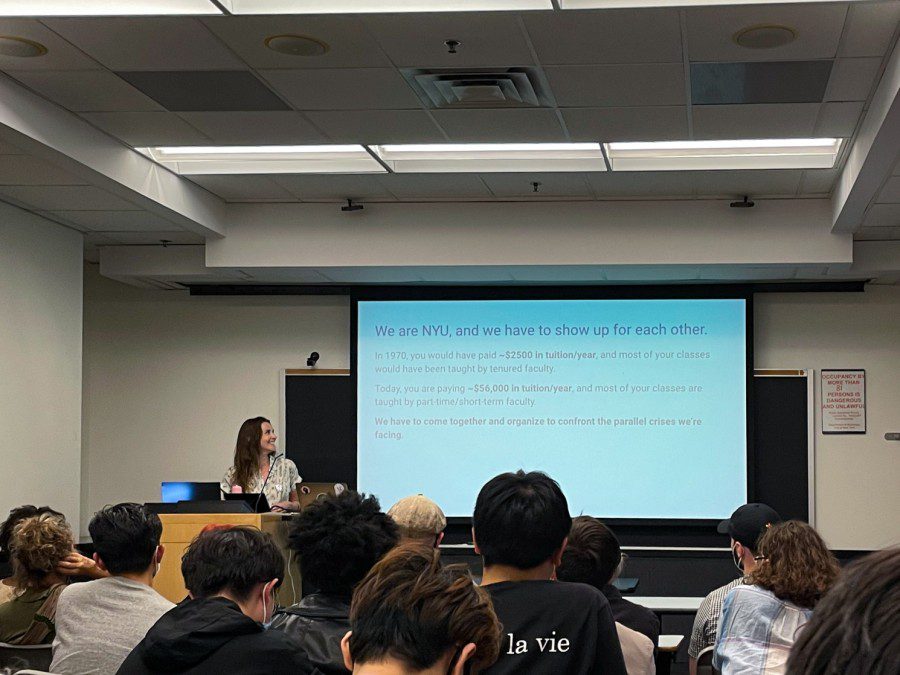Campus labor unions rally student support as adjunct union nears strike vote
Union representatives from six on-campus worker unions discussed their past wins, current bargaining goals and future demands from the university during a teach-in.
Students listen to a lecture by the Coalition on Labor Action according to Workers and Students and Young Democratic Socialists of America groups about the contract negotiations between NYU and its adjuncts union, ACT-UAW Local 7902. (Kayla Hardersen for WSN)
September 26, 2022
The Coalition on Labor Action according to Workers and Students, a community organizing group comprised of NYU School of Law students, and NYU’s chapter of the Young Democratic Socialists of America hosted a space for students, staff and faculty to learn about labor unions at NYU during a teach-in on Sept. 23.
Many of NYU’s employees are organized into unions. Participating unions include those representing graduate student workers; clerical, administrative and technical staff and laboratory workers; security officers; and full-time contract faculty.
NYU is currently bargaining with ACT-UAW Local 7902, the union representing adjunct workers. The union’s contract, which first came into effect in 2016, was initially set to expire at the end of August, but has since been extended twice to allow more time for the union to negotiate with the university. The contract is now set to expire on Oct. 31. The union is negotiating for higher wages and stronger reappointment rights, which protect faculty seeking contract extensions or renewals.
“Our feeling is that if you’re teaching four to six classes at NYU, you should pretty much be getting enough money to survive in New York City, which we all know is not easy,” said Scott Burkhardt, a Tisch adjunct faculty member who is part of the union’s bargaining committee.
The adjunct union is preparing to hold a vote beginning on Sept. 26. If it passes with a two-thirds majority, the union’s bargaining committee will be able to authorize a strike. The union hopes to avoid striking and reach an agreement with the NYU administration at bargaining sessions before the expiration of its contract, according to representative Cate Fallon.
NYU recognizes contracts with all of the aforementioned groups except for the union representing non-tenured faculty at NYU — CFU-UAW Local 7902. The number of tenured and tenure-track faculty has been steadily declining since the early 2000s at universities across the country. The data from 2016, the most recent data available, also shows that 73% of university instructors hold non-tenured positions, which include full-time non-tenure track, part-time faculty (which includes adjuncts) and graduate employee roles.
NYU most recently reached an agreement with GSOC-UAW Local 2110, the graduate student union, in June of 2021. The union fought for an updated contract with the university in 2006, and in April 2021, thousands of graduate student workers went on strike, calling for another contract negotiation. After a three-week-long strike for increased benefits, including salary raises and support for out-of-pocket healthcare costs, the union won a new contract with the university.
“We are seeing more power ending up in the hands of NYU administration because we don’t have tenure-track faculty who have job security and can stand up and push back,” said Elisabeth Fay, a clinical associate professor in the CAS expository writing program and an organizer with CFU-UAW. “This shows us an NYU administration that is increasingly empowered to decide what kind of research gets done here, what courses are taught here, how they’re taught — and that’s not great.”
Many of the union representatives spoke on how they have fought for healthcare benefits for their constituents. UCATS Local 3882, for example, has been fighting for better coverage for NYU’s administrative staff since its inception in 1979. In the early 1990s, union organizers won benefits for same-sex partners of NYU employees. More recently, they have worked with the university to update the union’s health insurance policy to be more inclusive of transgender workers.
“It’s not just wages and working conditions,” Christopher Crowe, the vice president of UCATS 3882, said. “Both my wife and myself have had some major health issues in just the last two years, and we’ve been able to get excellent care and not go bankrupt in the process.”
Nearly one-third of the event’s attendees were union members and two-thirds were active in political organizations, according to a poll conducted during the teach-in. Union representatives emphasized that community support is vital to the organizations’ fights and encouraged students and faculty to get involved.
“Unions don’t require people who have 20 years of experience organizing campaigns,” said Jeff Stark, a Steinhardt adjunct professor and the recording secretary of the adjunct union. “Unions require dedicated people that come from the bottom up, decide to get involved, see a problem and try to make it better.”
Contact Kayla Hardersen at [email protected].




























































































































































